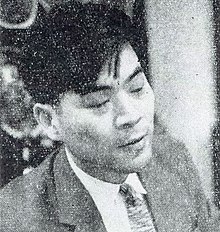Yoshimoto Takaaki
Yoshimoto Takaaki ( Japanese 吉 本 隆明 ; also Onyomi : Yoshimoto Ryūmei ; born November 25, 1924 in Tsukishima, Chūō , Tokyo Prefecture ; † March 16, 2012 in Bunkyō , Tokyo Prefecture) was a Japanese poet, literary critic and philosopher.
The son of a ship's carpenter studied electrochemistry at the Tokyo University of Technology from 1944 to 1947 . From 1952 to 1956 he worked for the Tōyō ink factory , from which he was fired because of union activities. As a critic, he became known in 1956 with a work on Bungakusha no sensō sekinin ( 文学 者 の 戦 争 責任 , German "The War Responsibility of the Letters "), which he had written together with Takei Teruo .
In the early 1960s he became involved in the movement against the Japanese-American Security Treaty , and between 1968 and 1970 he sympathized with the student movement in Japan, on which he had great influence. As a philosopher, he received works such as those by Marx and Hegel , although he distanced himself critically from Marxism . Since the 1980s he has been oriented towards French post-structuralism . His most influential works were Gengo ni totte bi towa nani ka ( 言語 に と っ て 美 と は な に か , “What is beautiful for literature?”; 1965), the Shinteki genjō ron josetsu ( 心 的 現象 論 序 説 , “Introduction to the world of psychic phenomena "; 1971) and the Kyōdō gensō ron ( 共同 幻想 論 ," Treatise on communal ideas "; 1966-67).
Yoshimoto is the father of the writer Yoshimoto Banana and the manga artist Haruno Yoiko .
swell
- Reinold Ophüls-Kashima: Obituary for Yoshimoto Takaaki (1924–2012) . In: Deutsche Gesellschaft für Natur- und Völkerkunde Ostasiens (Hrsg.): OAG Notes . May 2012, p. 28-30 ( PDF ).
- Wesley Sasaki-Uemura: Yoshimoto Takaaki (1924-) . In: James L. Huffman (ed.): Modern Japan: An Encyclopedia of History, Culture, and Nationalism . Routledge, 2013, ISBN 978-1-135-63490-2 , pp. 298 ( limited preview in Google Book search).
| personal data | |
|---|---|
| SURNAME | Yoshimoto, Takaaki |
| ALTERNATIVE NAMES | 吉 本 隆明 (Japanese); Yoshimoto, Ryūmei (alternative reading) |
| BRIEF DESCRIPTION | Japanese poet, literary critic and philosopher |
| DATE OF BIRTH | November 25, 1924 |
| PLACE OF BIRTH | Tsukishima, Chūō , Tokyo Prefecture |
| DATE OF DEATH | March 16, 2012 |
| Place of death | Bunkyō , Tokyo Prefecture |
